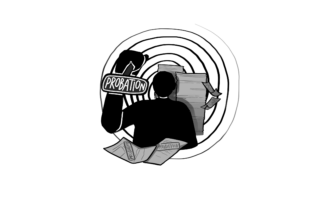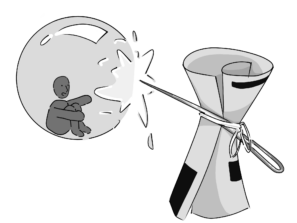

This editorial represents the unanimous opinion of all 14 Outlook editors.
Young people continue to have the lowest voter turnout out of any age group. According to a 2018 poll by the Atlantic and the Public Religion Research Institute, a mere 28 percent of young people ages 18 to 29 are “absolutely certain” they will vote in the midterm elections. The Outlook believes all young people should vote or register, and those who are not eligible should participate in democracy in other ways.
There are dozens of reasons why young people choose not to vote or to register, but we believe these reasons are insufficient. Voting is a civic duty, an essential part of democracy and something that every eligible American should participate in.
One of the most common excuses of young people who do not vote is that none of the issues affect them. While things like healthcare, property tax and social security might not have a noticeable effect on teenagers now, they will most certainly impact them later in life. Furthermore, if young people want politicians to pay attention to issues they care about — whether that’s anything from college tuition to gun laws — they have to vote. If young people show up to vote in large numbers, then politicians who want to win will have to appeal to young voters.
Another popular misconception is that a single vote, especially in a reliably blue state like California, doesn’t matter. However, voting impacts much more than who serves as president. Midterm elections, which occur every two years, allow voters to elect mayors and members of Congress, which represent their local community. Midterms also include propositions, pieces of legislature that voters can approve or reject, which have far more of an influence on local counties and districts. Some measures, for example, address things like funding for our school district.
“Young voters have the power to sway elections”
Young voters have the power to sway elections. According to census data compiled by the Pew Research Center, the number of millennials who are eligible to vote is almost equal to the number of eligible baby boomers (those born between 1946 and 1964). Bloomberg estimates that Generation Z (those born between 1995 and 2005) even outnumber millennials in terms of population. If these young Americans show up to vote, they have the power to swing elections in battleground states, or states where both parties have similar amounts of support and elections are extremely competitive.
A single vote is powerful. If it wasn’t, then voter suppression wouldn’t continue to exist. Since the 2010 election, 24 states, particularly battleground states, have passed new voting restrictions. Many of these restrictions require photo identification, which disadvantages the increasing number of young people who do not have a driver’s license. In Wisconsin, for example, such requirements during the 2016 election prevented 17,000 registered voters from voting. Politicians know that a vote is valuable, and many of them rely on the expectation that young people will not show up to the polls.
“Politicians know that a vote is valuable, and many of them rely on the expectation that young people will not show up to the polls”
Young people, especially in our district, are informed on the importance of voting. Most understand the basic functions and components of government and, thanks to the efforts of students and our administration, have been encouraged to preregister.
Admittedly, most Aragon students are not eligible to vote due to immigration status or age. However, students should still participate in our democracy, whether by contacting representatives, attending town hall meetings, writing letters to the editor of a local newspaper or taking part in demonstrations. Students eligible to register or pre-register should do so as soon as possible, as it makes voting easier in the future; Voters who cannot show up in person can also easily mail in their ballot.
Voting is not a nuisance, but a privilege and responsibility that civil rights leaders and women’s rights advocates have spent years fighting for. Rather than complaining about the current state of our country, let’s change it. Our vote — our voice — only has power if we speak up and show up.


